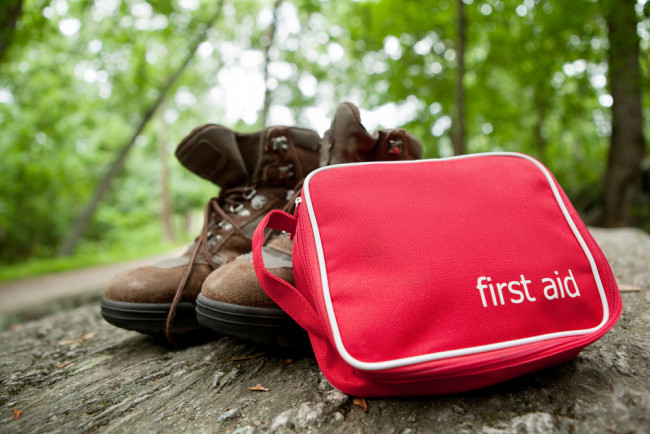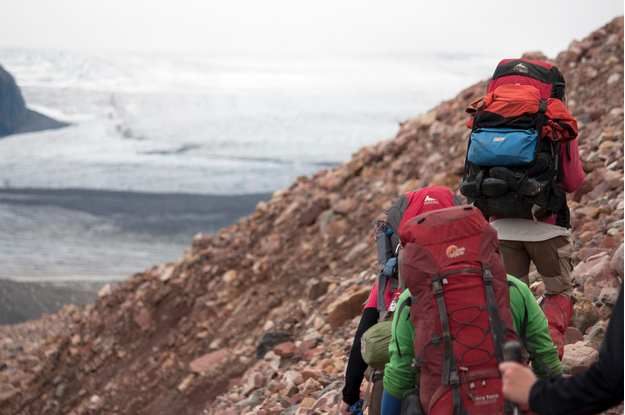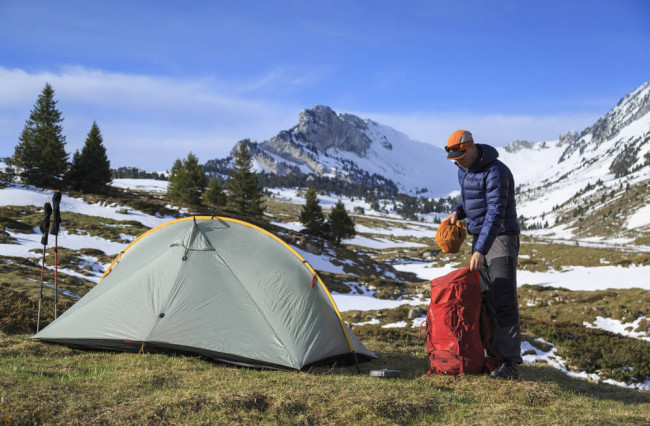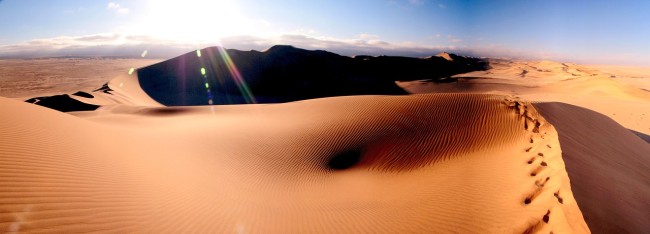
It’s not exactly breaking news to tell you that desert environments aren’t always the most hospitable places on Earth. Just ask Mauro Prosperi.
Whilst we don’t want you to go off wandering in the desert and get lost, we also would never discourage anyone from seeing everything the world has to offer and trekking off the beaten track a little.
On the off-chance you find yourself stranded, here are some essential tips on how to survive in the desert.
Planning is everything
Don’t just go off wandering aimlessly or you’re more than likely going to end up in the middle of nowhere. Plan when and where you’re going to, how you’re going to get there and back, where you’re going to be staying and do so in meticulous detail. Part of the attraction of adventuring is not having a plan, but the desert really isn’t a place you want to get lost.
Take the right survival gear
Hopefully you won’t need it, but take some survival gear with you just in case. You’ll need:
- First aid kit
- A knife or multi-tool
- Water purification tablets
- Compass (you can’t rely on GPS in the desert)
- Some kind of scarf, bandana or dust mask in case of sand storms
- Something to start a fire
- Some form of lighting, such as a head torch or lantern.
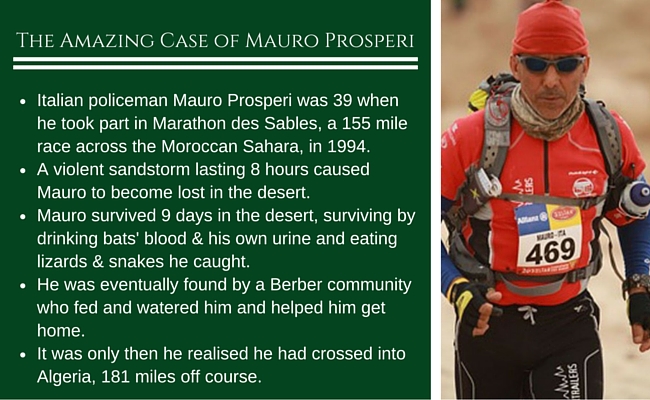
Tell people where you’re going
Once you’ve made your plans, make sure people know about them. Tell them where you plan to be and when so that they can track of where you should be. Should you not turn up then someone can start to do something about it. You won’t be able to rely on GPS or mobile phone signal in the desert, so don’t presume you will just be able to call if you get lost.
Keep covered
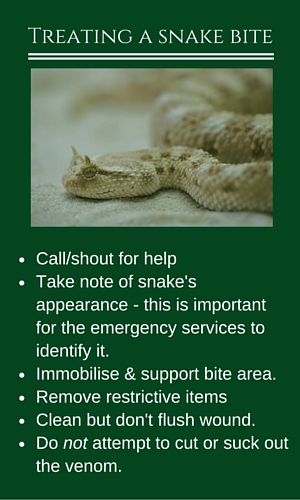 Being exposed to direct sunlight in the desert is not going to end very well unless you do something about it. Always have a hat with you to protect you from the sun, preferably one with a wide brim that can offer some shade for your face and neck. If you don’t have a hat, try and fashion some kind of headgear out of any spare clothing you have with you. You should also wear thin gloves as these will help minimise sweat loss through evaporation.
Being exposed to direct sunlight in the desert is not going to end very well unless you do something about it. Always have a hat with you to protect you from the sun, preferably one with a wide brim that can offer some shade for your face and neck. If you don’t have a hat, try and fashion some kind of headgear out of any spare clothing you have with you. You should also wear thin gloves as these will help minimise sweat loss through evaporation.
Light coloured clothing is better for reflecting heat, although darker clothing better protects against UV rays. If you can, wear light coloured clothing that has built-in Ultraviolet Protection Factor (UPF).
Of course you should also wear sunglasses or goggles to protect your eyes from sunlight.
You may be tempted to remove clothing to keep cool, but you must keep covered.
Take plenty of water with you
Naturally, you’re going to need a fair bit of water. When walking in sunlight and temperatures of 40 degrees celsius, the average person loses 900ml of sweat every hour. Try and split any fluids across as many water carriers as you can to minimise leakage and store out of direct sunlight if you can.
Related: How To Prepare For A Winter Walk In The Snow
Pack the right foods but don’t eat it
Well you can eat it, but do so sparingly. The more you eat, the thirstier you’ll get, so only eat what you need to keep hunger at bay. You also need to make sure you pack the right food or you could end up doing more harm than good. Pack foods that are full of nutrients but don’t take up much space.
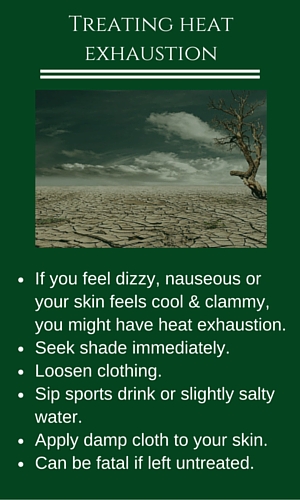 Travel at night if you can
Travel at night if you can
If you have to walk through the desert, only try and do so during the night if you can. This will reduce the chances of you becoming dehydrated, and will save your body around three litres of water per day.
During the day, you should try and stay in any shelter you have to stay away from the hot sun. If you don't have shelter, try and make your own using any sticks/poles and material to form a shady place.
Be prepared for chilly nights
Even though desert environments are hot during the day, they can also get incredibly cold at night. Therefore, if you can, pack some warmer clothing for when the temperature drops. Doing any walking you have to do during the night will also help to keep warm.
Should you stay or should you go?
An important decision to make is whether to stay in one sport or whether to move on. If you have shelter and a supply of water then you might be best staying where you are, especially if someone knows where you are, although if you run out of water then you’ll need to try and find a source from somewhere.
Signal for help
If you have the necessary equipment, you can try signalling for help. Building a fire will send smoke into the air, whilst using a pocket mirror can reflect sunlight to attract attention. It might sound like something from a film, but even spelling out ‘SOS’ or ‘HELP’ in sticks or rocks is better than nothing.
Related: The Hiking Gear You Need To Survive The UK Weather
Finding water in the desert
If you run out of water in the desert, then it’s imperative you find a source as soon as possible. Here are some tips on how to find water in the desert…
- If you can see any vegetation, head there.
- You may find water has collected in rocky areas following a rainstorm.
- Dew may gather on plants or rocks at dawn.
- Follow animals - if you see animals or their tracks then you’ll almost always be near a water source, particularly if the tracks are leading downhill. Even insects may indicate nearby water, so look for swarms.
- You may need to dig for water. If so, follow this guide:
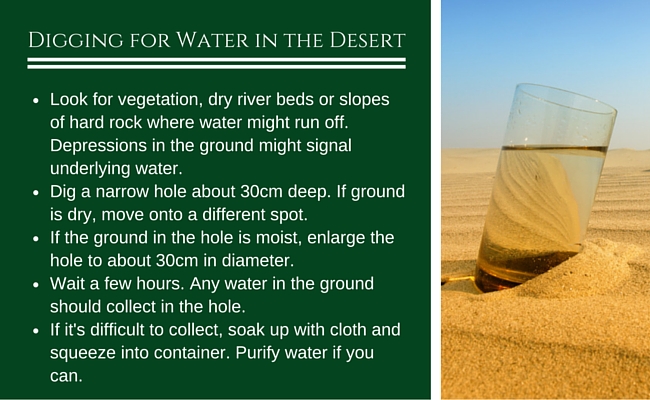
Take water purification tablets with you. Water that you do find may well not be safe to drink and could make you ill. If you don’t have any tablets, drink the water anyway, as dehydration will affect you much faster.
Beware of dangerous animals
Obviously you’re not going to want to engage animals that could cause you harm, so stay away from any animals you see, and follow at a safe distance if they’re heading towards water. Be careful putting your hands under or into rocks as there may be spiders, scorpions or snakes hiding there.
Related: The Most Essential Pieces Of Camping Cookery Equipment
Try and stay calm
If you panic then you won’t be in a clear frame of mind to think what to do, and you’ll also waste energy. It can be tricky, but try to stay calm.
Do you have any tips for how to survive in the desert? Let us know!




 Being exposed to direct sunlight in the desert is not going to end very well unless you do something about it. Always have a hat with you to protect you from the sun, preferably one with a wide brim that can offer some shade for your face and neck. If you don’t have a hat, try and fashion some kind of headgear out of any spare clothing you have with you. You should also wear thin gloves as these will help minimise sweat loss through evaporation.
Being exposed to direct sunlight in the desert is not going to end very well unless you do something about it. Always have a hat with you to protect you from the sun, preferably one with a wide brim that can offer some shade for your face and neck. If you don’t have a hat, try and fashion some kind of headgear out of any spare clothing you have with you. You should also wear thin gloves as these will help minimise sweat loss through evaporation.

